The 1st Independent Polish Parachute Brigade
(1 Samodzielna Brygada Spadochronowa)
My Escape From Stalin
Crossing The Caspian Sea
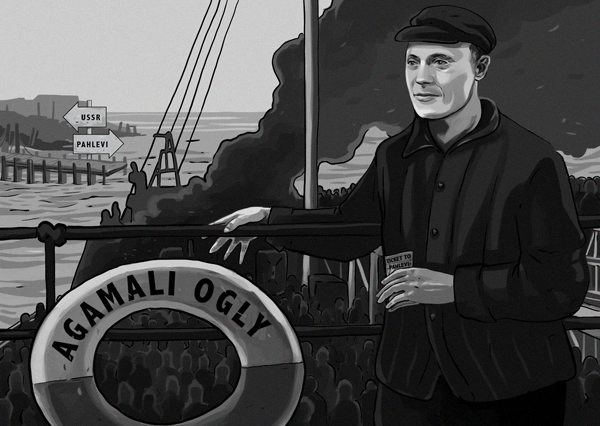
Editors Overview (Before We Go Into The Story!)
From 3 April 1942 to 7th May 1942 the military records show that my grandfather was getting "transport from the U.S.S.R. to Polish Armed Forces Base Depot" (in Egypt or Palestine)
My grandfather arrived in Pahlevi on 3rd April 1942. (Editors Note: We know this because the officials kept registers of all the boats arriving and the military units that were on those boats. There was only one boat carry his unit, the 28th Infantry Regiment, this arriving on 3rd April 1942).
The official boat/ship arrival records didn't give the name of the boats, only boat numbers (i.e: 1,2,3 etc). But, for once, some good fortune came my way. A chap by the name of Rymaszewski runs a blog and in it he refers to arriving at Pahlevi on the 3rd April 1942 in the "Agamali Ogly".
Putting all the facts together, we know for certain my grandfather was one of those on that famous boat.
As the boat crossing across the Caspian Sea took 1-3 days, we can assume that he left Krasnovodsk between 31st March 1942 to 2nd of April 1942, most likely it would have been the 1st or 2nd of April 1942.
So back-tracking from this, he had to get from Lugovoye in Kazakhstan to Krasnovodsk. Most likely this would have been by train organised by the NKVD (Who were ever so helpful and efficient at getting rid of this "problem" of hundreds of thousands of starving and ill people being a "burden" on their country).
Under General Anders direction, he ended up getting out of the USSR via Krasnovodsk, across the Caspian Sea to Persia then Iraq. To General Anders, we are extremely grateful for this, because left in the USSR things could have gotten very much worse.
And now to his story...
The Agamali Ogly
To tell the story of my journey from Krasnovodsk (Modern day Turkmenbashi) in the Soviet Union across the Caspian Sea to Pahlevi in Persia is a privilege. I say a privilege because thank dear God I am alive, many did not make this journey and survive.
To begin, so there we were at Krasnovodsk, an industrial port stinking of commercial oil and fish.
We did not care, freedom awaited us, or so we had been told by General Anders. It seemed hard to believe, but the sheer amount of Polish evacuees and military at Krasnovodsk, along with the grossly overloaded large re-purposed oil tankers and cargo ships that regularly left the port added certainty to his promise to us.
At Krasnovodsk there were camps specifically for the military, mine was there (the 28th Infantry Regiment), in fact the entire 10th Division was there.
There were also civilian camps. Sometimes people would come from the civilian camps trying to join the military camps in the hope of getting more certainty of getting out of the Soviet Union.
I remember an experience where a mother and her young daughter pleaded with a soldier beside me. They were beyond desperate to ensure they got out of the Soviet Union.
He agreed to say this was his wife and daughter to the authorities thus giving her greater certainty. It worked, because she was on the ship with us.
All around me in Krasnovodsk I saw continued suffering. There were Typhus outbreaks and all manner of ills and disease. We Poles had taken a battering at Stalins command and I was angry! Very angry!
My fellow countrymen were sick, ill and dying. This was needless, they were in good health in Poland, Stalin had made this happen! What did he think we were, inhuman?
I was lucky to be in "Wave 1" of the evacuations from the Soviet Union. It was a massive operation, over 30,000 military and 11,000 children would be evacuated. I couldn't wait to board the ship.
Boarding
Finally, our turn came to board the ship. Thousands of us queued up, desperate to board, desperate to get to sea and leave. We felt like the Israelites leaving Egypt, with General Anders being the modern day Moses.
Beside the ship we all stood, with one common goal. Escape. Children sobbed in muted tones, mothers tried to calm them whilst trying to gain control of their anticipation anxiety.
Soldiers battered by war extended unprecedented hands of kindness, helping each other, helping the sick, the dying, the young, the infirm. We Polish people still had our dignity and would show Stalin what an animal he was, even if only by our good conduct.
We shuffled forward, bit by bit, hours passed. Finally the gangplank.
Two people stood at the foot of the gangplank, one an NKVD officer and the other a Polish officer. Papers were checked (the NKVD were still not too keen on letting us out of their Soviet Paradise) and both the Polish officer and the NKVD officer ticked names off lists and allowed you to board.
I had never been on a ship before, it was huge! It had a black hull with a white top deck…but it stank and terribly too! Of what I do not know but it made you retch. I did not mind. This was freedom, this was escape, for me this was a palace, a floating one!
We made our way past the toilets, there were massive queues for them. The stench there of excrement was overpowering, I certainly had no plans of going there if I could help it. Typhus and other ills were giving us horrendous stomachs and bloody diahorea.
Those poor Polish fellow countrymen, nothing was sacred anymore, Stalin had tried to reduce us to animals and nearly succeeded.
Finally we got to the top deck, it was packed, really packed. Was there even anywhere to stand? I saw a friend and managed, goodness knows how, to join him at the handrail.
As we stood and talked, the breath was being squeezed out of me by the sheer number of people on deck, this could not be safe, could it? But I didn’t care, I would rather die escaping, than die Stalins prisoner.
Crossing the Caspian Sea April 1942
Finally, the boarding plank went up, the horn sounded and we began to pull away from dock and make way to sea. Cheers went out amongst some of us, patting each other on the back with jubilation, eyes wide open with anticipation of a new future for all of us.
Our boat, the Aga-Mali-Ogly
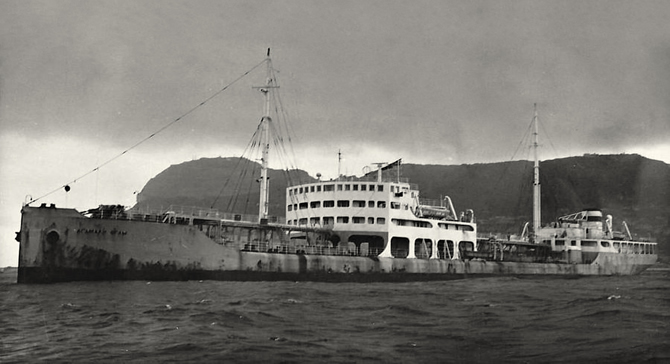
Some though sat, expressionless, with a distant haunting look in their eyes, too beaten by the ravages of Siberia and Kazakhstan to care. These had lost hope and yet, with a natural built in instinct for survival had made the journey to Krasnovodsk.
And yet there were others crying, some being consoled by fellow passengers, others just left to howl.
That moment in time was the most surreal, these images haunt me and still give me nightmares because in that ship was a snapshot in time of all the atrocities enacted on the Polish people.
For my part I wanted to yell out some sort of obscenity at the NKVD officers that were on the docks, but I did not dare for last time I had been outspoken against them they transported me to Siberia, to the Gulags, for hard labour.
No, I decided, this transport arranged by the NKVD, overcrowded as it was, would be my way out of the Soviet Union. I feared that if I yelled something at the NKVD the boat might be recalled and I would be hastily marched off to some Gulag again. My yelling could wait till later, this trip was much more important to me.
As we set off the wind picked up and daylight began to fail. We had heard stories of a boat that had sunk just days ago and I secretly was very anxious that we might not make it either. I put my fears to one side quickly because a strange but familiar aroma was starting to fill my nostrils. The aroma of excrement.
Where was it coming from I wondered? I looked down, urrghhh! There was excrement all over the deck, some people were still in the process of relieving themselves. There was even sick mixed amongst it all.
Before the war this would have made me feel very queasy but having been through far worst experiences such as seeing soldiers dying after having their legs blown off at Lomza and Zambrow, I was able to stomach it fairly easily.
Someone called out "Are you a pig? Why can't you use the toilet or will you let us all down?" The person replied that there were only 4 toilets for the entire ship and that people were taking a very long time about their business due to being ill and with dysentary.
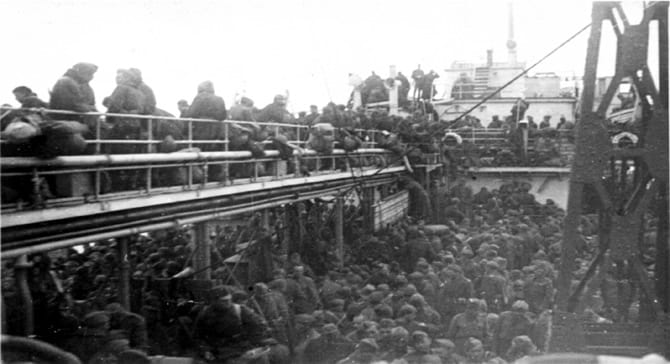
I had a quick look around and by my guesses, as much as 50% of us, maybe more, had dysentary or some other serious health problem. But, it may sound strange, I did not care for the excrement. Stalin had put us through a lot worse. I focused on reaching the other side of the Caspian Sea.
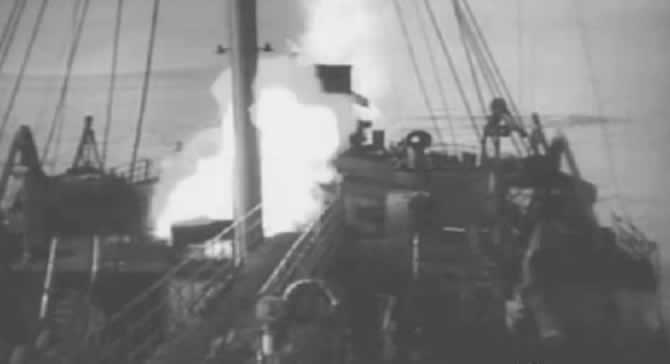
Day turned to night, the waves got stronger and bigger and our boat started to roll. Many were sick, all holding on for dear life to anything they could find, railings, masts, rigging, even each other.
Cries, screams and yells broke out, the weather had worsened and our very lives seemed to be at risk. One person fell over the railings into the cold dark unforgiving sea, he didn’t even call out and there was nothing we could do for him.
Another person had died without anyone around them noticing and on the next big wave a lot of water crashed onto the decks and his lifeless body was washed to the railings.
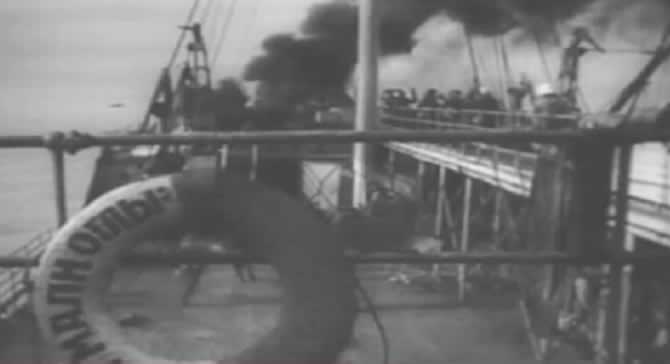
The heaving and howing of the ship somehow seemed to result in the railings accepting him to his watery grave. Dear God I thought, where are you know and why must we still suffer?
For a few hours I had been watching the big fish (whales?) following our boat and I thought it a strange thing.
My friend then told me that because so many people were either falling overboard in the waves or dying and being put overboard, the wales were feeding on the bodies. Was their no dignity for our fellow countrymen at all?
As if that was not bad enough, on the dock at Krasnovodsk they specialised in preparing herring that the local boats had caught and putting them in vast vats of salted water.
These had been handed out to us, which we greedily and quickly ate because we were all so vastly malnourished. Well, this had now caused serious dehydration amongst us along with a raging thirst.
All around us we were surrounded by water and yet not a drop could we drink as it would only worsen matters. Some did drink it and quickly became delirious through sheer dehydration.
Thankful as I was to be leaving the Soviet Union, this boat trip had not been well planned as there was no food or water for us.
During the night the standing that we had done at the dockside had exhausted our legs. This was made worse by the fact we were so closely sandwiched together on that boat that sitting was near impossible.
So we were all standing all night, bracing against every pitch of the ship. My legs were beyond exhaustion but I did not dare sit don because of the extensive excrement and sick rolling around the deck.
Due to the shortage of toilet facilities on the ship, many resorted to putting their backside over the railings, holding on for dear life as the ship pitched and waves rolled by. Going to the toilet was quite literally a matter of life or death.
We survived the night, maybe the only way we had survived was because as a group we were strong, all going through the same horrors, illness, sickness and loss of personal privacy.
To this day, this experience remains one of my strongest memories and whenever I worry about something I remind myself of that trip across the Caspian Sea.
Then someone shouted out that they could sea Pahlevi in the distance. Suddenly, the sick, the ill and everyone else was jumping, shouting and screaming for joy, tin pans were rattled on the metal of the ship!
Life seemed a distinct possibility, quite different from last night when we were precariously crashing through waves risking life and limb.
At last Stalin was gone! What would life have in store for us in a new foreign land? Would it be better than the Soviet Union I wondered?
As we approached port, the boat slowed, anchors were dropped. Panic set in, I was only minutes from Pahlevi and yet what had gone wrong, why were we not going into the port I wondered?
Leaving Our "Ark" For The Promised Land - Pahlevi
Soon, the answer became clear when a small steamer boat drew alongside. We were to be taken to shore via the smaller steamer as the large boat was too large for docking in Pahlevi.
Onetime the steamer arrived and only the dead were taken away. I was shocked to see so many of them piled up in makeshift canvass coverings.
Each steamer load of living people, were waved off and cheered on by us. I swear that when they reached shore I could hear whoops of jubilation ring out.
Finally my turn came, I descended to a lower deck where a makeshift ramp had been lashed between the steamer and our boat. I hastily got onto the steamer.
As I looked upwards I could see the hulk of the rusting ancient soviet boat above me, the sides of it completely covered in a disgusting mess from the amont of people releiving themselves over the side during our trip. We tied off and made for the shores of Pahlevi.
A strange eerie silence broke out amongst us, I think we were all nervously anticipating what as ahead.
At the same time our thoughts turned to all those that we had lost, both in ar, in the Gulags, through dysentary and disease and on the Caspian Sea. How many more God, how many more, I asked?
The steamer then reduced engine power as we coasted up to the docking point.
We had come out of an inhuman land, Siberia, and now the "promised land" Pahlevi (In Persia) greeted us.
Please Donate!
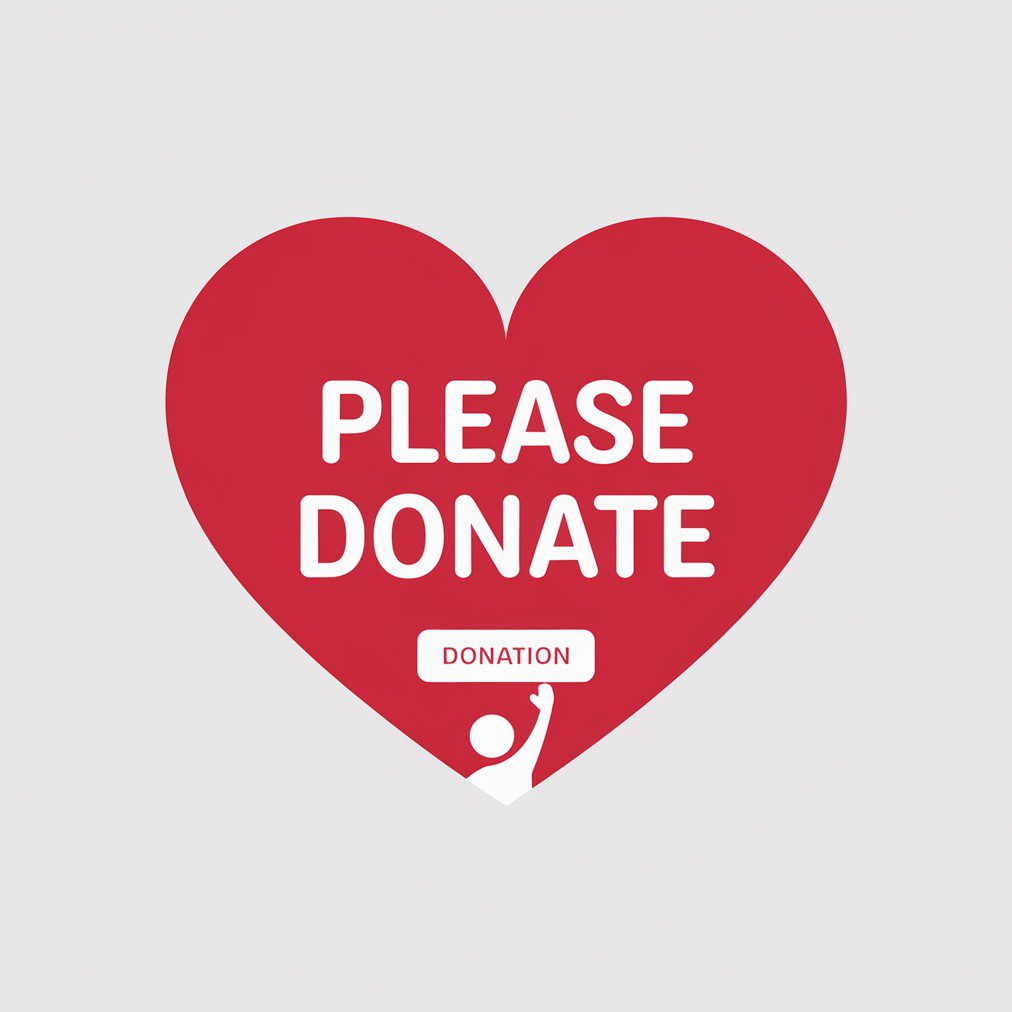
Uncover The Past - Support The Future
Please don't "grab & go"! Each year, 12,000 people visit this website to trace their Polish ancestry, uncover family stories, and connect with their roots. I believe that history should be accessible to all - but keeping this website alive since 2017 comes at a personal cost to me, 8 years @ £1000 per year (website mgt fees) has left an £8000 dent...with only £502 in total donated up to 31/01/26 😱😱😱.
Every detail you uncover and every story you piece together helps you piece family history together. Please donate if you found the existing information on this site useful, help me keep the site alive! Thanks! Jason Nellyer (Researcher & Site Owner)
PS - You'll even get a personal thank you for me for any donations. Truly valued!